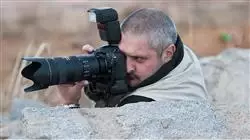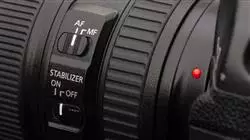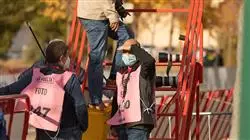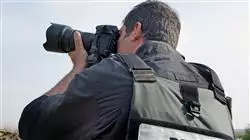University certificate
The world's largest faculty of journalism and communication”
Description
Specialize in Photojournalism, one of the disciplines with the greatest number of professional opportunities, acquiring the knowledge you need in shooting, editing, mobile photojournalism and broadcasting in new channels"

The professional master’s degree in Photojournalism provides journalism professionals with specialist knowledge from the point of view of the photographer, and the role they play in the digital world. Among the skills to be acquired are the knowledge and application of the technologies and systems used to process, elaborate and transmit information in the form of images, and express and disseminate creations or fiction from photography.
Specialize in the ideation, planning and execution of informative or visual communicative projects, specifically in the development and proposal of a photographic image adapted to the new social, cultural, economic and technological contexts. This Professional Master's Degree is taught by a team of teaching professionals who are experts in the different areas of this sector. The program brings together a range of knowledge that is very rarely found "united" in terms of what is taught at other universities.
The structure of the professional master’s degree is developed in such a way that it begins with general knowledge based on photojournalism, with its history and genres. It then moves on to specialist knowledge, with a module devoted entirely to sports photojournalism, one of the disciplines with the greatest output and the most difficult to cover correctly, and one that is not usually studied in such a complete way.
After this first part focused mainly on theory, we move on to the more technical part, ranging from the operation of a camera to editing and digital development. During this process, there is a module dedicated to the acquisition of knowledge to develop "perfect" photographs and a module on the acquisition of skills to create and work in a photographic studio or photojournalism through a smartphone, for example.
Subsequently, the program focuses on social networks and image verification, which is so necessary today since, in 2017, the Oxford dictionary established "Fake News" as word of the year. Finally, Module 10 deals with ethics and image rights, aspects that are necessary to know and implement on a daily basis if you want to work as a photojournalist.
A unique syllabus in terms of content diversity, which enables those interested in this branch of the profession to develop specialized and necessary knowledge, to work with skill and stand out in a world invaded by photographs, many of which don’t have the minimum quality required to be published in a relevant media.
A study focused on the real acquisition of specialized knowledge that will allow you to take impactful photographs that will set you apart from the competition in the field of photojournalism"
This professional master’s degree in Photojournalism offers you the advantages of a high-level, educational and technological course. These are some of its most notable features:
- The latest technology in online teaching software
- A highly visual teaching system, supported by graphic and schematic contents that are easy to assimilate and understand
- Practical cases presented by practising experts
- State-of-the-art interactive video systems
- Teaching supported by telepractice
- Continuous updating and recycling systems
- Autonomous learning: full compatibility with other occupations
- Practical exercises for self-evaluation and learning verification
- Support groups and educational synergies: questions to the expert, debate and knowledge forums
- Communication with the teacher and individual reflection work
- Content that is accessible from any fixed or portable device with an Internet connection
- Banks of complementary documentation permanently available, even after the course
A highly specialized professional master’s degree that includes the study of the most innovative and efficient technology for taking photographs from mobile devices and the use of the most popular apps currently in use"
The team of teachers of the professional master’s degree in Photojournalism has extensive teaching experience at university level, both in undergraduate and postgraduate programs, and extensive experience as working professionals. This allows them to know, first hand, the profound transformation that this sector is undergoing, with the incorporation of new models of viewer or receiver of messages, control of networks, etc. Their direct experience, their knowledge, as well as the analytical capacity of the faculty, are the best source to grasp the keys to the present and the future of a vocational and exciting profession for those who love sports and communication.
The 100% online methodology of the professional master’s degree offered at TECH Global University allows students to overcome the restrictions imposed by work obligations and the difficulty of balancing studying with their personal life.
All this educational content makes this Professional Master's Degree a specialization degree in Photographic Journalism, which compiles all the relevant aspects that are essential to help journalism professionals become authentic experts in this profession.
All the knowledge you need to confidently face the different situations that arise in this profession, giving you the skills you need to make quick decisions"

Achieve the necessary level of quality in your photographs to make covers for the media, with images that gather all the required aspects of quality, information and impact"
Objectives
The objective is to offer the student a journey through the most complete theoretical and practical knowledge in Photojournalism. For this, TECH has established the necessary information in each and every one of the areas of this field, including general and cultural knowledge that will allow you to interpret the professional landscape and adapt to each requirement, creating informative, impactful and interesting images for any media.

The objective of this professional master’s degree is to train professionals who know how to practice in a multidimensional way, at a time when the use of the image has become a method of global expression"
General Objectives
- Examine the different photographic genres related to journalism
- Analyze the importance of photography in journalism
- Develop the evolution of the photographic press since its inception
- Study the most important photographers and works in the history of photojournalism
- Distinguish the genres and specialties of photojournalism
- Apply the techniques and specificities of each of them to praxis
- Discriminate the differences between Photojournalism for informative and opinion purposes
- Analyze the figure and functions of the sports photojournalist
- Establish an appropriate methodology to work in different sporting events
- Identify the value of the work of sports photography in recent history
- Generate specialized knowledge on the importance of photography on the front pages of sports media
- Examine the operation of a camera
- Develop the technical aspects of photography
- Know how to choose the appropriate settings for each photographic situation
- Address the concept of perfect photography
- Analyze how to create the perfect photograph
- Examine real cases and determine their photojournalistic intent
- Set up and dismantle the photo studio
- Perform the process of exposure control and photographic shooting, evaluating the final results
- Examine the fundamentals of illumination, and measurement techniques with continuous and discontinuous light equipment
- Establish a working methodology for the photographer's work in the photographic studio
- Identify all the tools necessary for the creation of a photographic studio
- Examine the features of the mobile camera
- Compose a framework of references to inspire and learn from
- Generate notions of editing and design
- Identify the main differences with the SLR camera
- Know the context and limits of digital development in photojournalism
- Analyze the basics and operation of free and paid image development software
- Learn photo development and retouching for professional application
- Study development techniques of constant use in current photojournalism
- Determine the importance of the impact of the Internet on photojournalism
- Analyze the use that media and professionals make of the network
- Discern the various possibilities that the network offers photojournalists
- Clarify the landscape of the debate
- Identify the ethical questions
- Present the main media cases
Specific Objectives
Module 1: History of Photojournalism
- Analyze the needs of the historical background of today's photojournalism
- Present the figure of Francisco de Goya as a precursor of Photojournalism
- Determine the informational applications that photography can offer
- Establish the limitations of veracity presented by the photograph
- Delimit the boundaries between the different photographic and journalistic angles
- Examine the historical context in which photography was born and its relationship with its appearance in the graphic press
- Address the importance of technological development in the history of photography and photojournalism
- Examine the impact of photography as a means of documentation from its emergence until the early 20th century
- Analyze the historical context at the journalistic level of the interwar period to understand the rise of photojournalism
- Generate specialized knowledge about the work of some of the most important photojournalists of the last stage of the 20th century before the irruption of digital photography
- See what has changed at the press level with the advent of digital development and the Internet
- Highlight the role of important women photographers in history
Module 2: Photojournalistic Genres and Specialization
- Establish the technical parameters that differentiate one genre from another
- Identify, from the image, the variety of photojournalistic genres
- Examine the editing techniques that apply to genres
- Propose a methodology for photo news, photo reportage, photojournalistic portrait and photojournalistic essay
- Identify the criteria for specialization in photojournalism
Module 3: Sports Photojournalism
- Analyze iconic photographs in the world of sports
- Study historical and current references in sports photojournalism
- Recognize the particularities of different sports disciplines
- Explore the language of sports through images
- Reflect on the treatment of diversity in sport through images
- Determine the importance of image in the celebration of the Olympic Games
- Research the role of women in sports
Module 4: Photographic Technique in Photojournalism
- Examine the internal and external parts of a camera
- Make specialized use of the camera buttons and settings
- Determine the relationship between exposure, speed and ISO to achieve technically correct photographs
- Analyze how to read the histogram and how to use it in real situations
- Measure light in any situation
- Correctly use image extensions depending on what the image is to be used for
- Analyze existing camera accessories and their practical function
Module 5: The Perfect Photo in Photojournalism
- Examine what aspects and materials are needed to create the perfect picture
- Analyze the concepts of depth of field and focus, the relationship between the two and their use to create the perfect photograph
- Recognize the rules of composition to apply them in real situations
- Use light for the benefit of better photography
- Differentiate between contrast, tension and balance in photography and use these concepts in real situations
- Address image symbology and how to use it in conjunction with perspective to convey ideas
Module 6: Studio Photography in Photojournalism
- Determine the materials necessary for the construction of a photographic studio
- Recognize the lighting techniques required for each photographic project
- Identify the elements involved in the photographic capture process, assessing their suitability for the execution of the project
- Shoot a portrait, a fashion shoot, a still life and an advertising project
Module 7: Mobile Photojournalism
- Generate specialized knowledge on the use of mobile editing applications
- Construct a report using only a cell phone
- Determine which accessories help in the image acquisition
- Establish the most relevant indications to improve photography
- Examine the use of the dual camera
- Use innovating image presentation with design applications
- Inspire the final work in other projects
- Recognize situations in which it is more effective to use the mobile camera
Module 8: Photo Editing in Photojournalism
- Deepen knowledge of the limits of retouching and development
- Analyze Adobe Bridge as a file organization software
- Introduce the main concepts of Adobe Photoshop
- Approach the development and retouching with Adobe Photoshop to make compositions or designs for editorial purposes
- Examine Adobe Lightroom and how it works
- Master professional image development with Adobe Lightroom
- Lay the groundwork for Capture One as a developer software
- Master professional image development with Capture One
- Establish the main free resources for photo development
Module 9: Social Networks and Verification in Photojournalism
- Examine how the image has entered the Web
- Determine the importance of citizen photojournalism in today's news landscape
- Establish the advantages and disadvantages of publishing images on generalist networks
- Develop the advantages and disadvantages of using specific networks for images
- Address how to publish, distribute and even market the photographs
- Understand the use of images in Fake news
Module 10: Image Rights in Photojournalism
- Generate specialized knowledge on photo protection
- Analyze the treatment of the child
- Examining minority representation
- Differentiate between manipulation and intentionality and the different types of manipulation
- Clarify new ways of visual representation
- Recognize the difference between public interest and public interest as applied to the image (morbidity)

A high-quality educational course, with the most advanced teaching resources, created to help you achieve the best results, optimizing your effort, dedication and learning in a constant and progressive way”
Professional Master's Degree in Photojournalism
.
Journalistic work in today's era requires professionals to have the specific skills and competencies to correctly portray every event that happens today. Particularly in the case of visual reporting, it becomes necessary for journalists to acquire the basic techniques to capture quality photographs in multiple fields. Taking into account that in TECH one of our main motivations is to provide academic content adapted to the current needs of the market, we designed a Professional Master's Degree in Photojournalism focused on providing professionals with the new technologies used to process, elaborate and transmit information through images. With this postgraduate course taught in 100% online mode, students will have the opportunity to strengthen their skills in daily practice, by developing an immersive learning on topics such as the history and genres of traditional photojournalism and / or digital (smartphones), the operation of a photographic studio and the handling of a camera, complemented by editing programs (Adobe Bridge, Photoshop, Lightroom) and digital development.
Take a Professional Master's Degree in photoreportage
.
At TECH's School of Journalism and Communication, we have designed a program with a global vision, our syllabus stands out for its versatility supported by telepractice; in addition, we have documentation banks to complement your study process. During a year of training taught by the best faculty, you will specialize in devising and planning visual communication projects; in turn, you will be able to create informative, impactful and interesting images for any media. You will also learn the technical basics of photography, ranging from lighting (histogram, continuous and discontinuous light) and the relationship between speed and ISO, to exposure control in a shot and the assembly and disassembly of a photographic studio.
Specialize in conveying information through photographs
.
By developing this program you will not only be an expert in the proper treatment of the photographic image adapted to social, cultural, economic and technological contexts, but you will also specialize in handling other basic aspects such as image rights and how they are published, distributed and marketed. Additionally, you will learn the variety and specialty of photojournalistic genres to build unparalleled reports. Once you finish your learning process you will obtain the necessary skills to practice as a world-class photojournalist.







